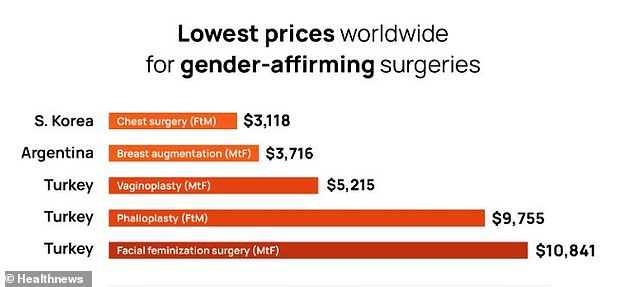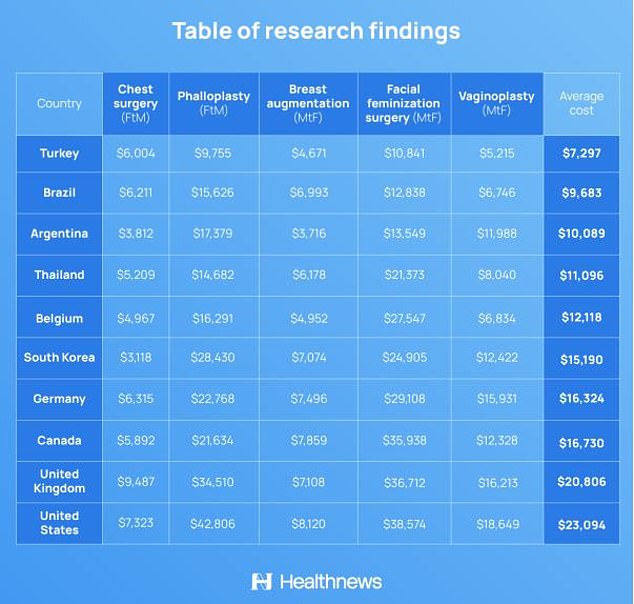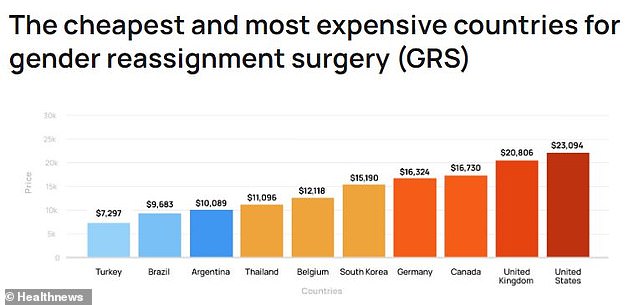Brazil, Argentina and Turkey are now the most popular and affordable destinations for gender reassignment surgery, analysis reveals.
The investigation by medical site Healthnews contrasts the popular belief that Thailand is the top country for transgender surgeries, where for years American and Western tourists have traveled for male-to-female and female-to-male surgeries.
Surgeries in Turkey are 68 percent cheaper than in the US, costing $7,300 on average compared to more than $23,000.
Turkey offers the cheapest phalloplasty, which involves the construction of an artificial penis, using skin taken from other parts of the body, facial feminization surgery and vaginoplasty, with average costs of $9,755, $10,841 and $5,215, respectively.
The country has a “relatively modest cost of living compared to Western countries and significantly lower clinical and laboratory fees,” the researchers said.
It comes as a transgender person shared their experience after receiving a new experimental surgery which involves removing their entire external genitalia.
Surgeries in Turkey are 68 percent lower than in the U.S., costing $7,300 on average compared to more than $23,000.

South Korea offers the lowest price for female-to-male top surgery, which involves removing both breasts to create a more manly-looking chest.
In the United States, a phalloplasty can cost around $30,000.
Thailand, despite being considered one of the top destinations for gender reassignment surgery, only comes in fourth place with an average surgery price of $11,096.
Brazil and Argentina are some of the cheapest options in Latin America, and Belgium is the cheapest option in Europe.
South Korea offers the lowest price for female-to-male top surgery, which involves removing both breasts to create a more manly-looking chest.
For breast augmentation, used in male-to-female top surgery, Argentina is the cheapest option, costing $3,716.
The United States is the least affordable country for these types of surgeries due to limited insurance coverage for transgender people.
The researchers chose 10 countries that are most frequently mentioned in medical tourism literature, online forums and health news.

The United States is the least affordable country for these types of surgeries due to limited insurance coverage for transgender people.
These are: Argentina, Belgium, Brazil, Canada, Germany, South Korea, Thailand, Turkey, the United Kingdom and the United States.
The researchers collected price data from an average of 30 sources per country, including local surgical practices, online health forums, and healthcare price comparison platforms.
For facial feminization surgery, the researchers evaluated the package of procedures offered by the clinics.
These may include forehead contouring, rhinoplasty, cheek augmentation, chin and jaw reshaping, tracheal shaving, lip augmentation, and hairline reduction, depending on the individual’s wishes and the clinic’s offerings.
According Medical Tourism MexicoAbout 1.2 million Americans travel to Mexico each year to undergo discounted elective surgeries, including cosmetic operations.
In 2020, about 290,000 Americans traveled abroad for medical and dental procedures, according to Forbes. In 2019, the figure was 780,000.
At the same time, the number of sex reassignment surgeries is increasing rapidly around the world.
In the United States, the number of gender-affirming surgeries nearly tripled from 4,552 in 2016 to 13,011 in 2019.
In the UK, 54 surgeries were performed in 2000, compared to 143 in 2009.
Belgium is known for its progressive views on trans rights and healthcare and allows legal name and gender changes without medical certification.
The Belgian health system has supported sex reassignment surgery as a standard treatment since 1985, and there is a transgender politician, Petra De Sutter, among the country’s current government.
Türkiye, on the other hand, has significant gaps in transgender rights. Human rights organizations have reported that violence against transgender people in the country continues.
As with any surgery, there is a risk of complications, but this risk usually increases when traveling abroad.
Some countries’ requirements for surgeon credentialing may be lower than what would be required in the U.S., and there is also the risk of counterfeit medications and lower-quality medical devices.
Medical tourism is a multibillion-dollar global market that continues to grow, the CDC said, with destinations for U.S. residents including Argentina, Brazil, Canada, Colombia, Costa Rica, Cuba, Dominican Republic, Ecuador, Germany, India, Malaysia, Mexico, Nicaragua , Peru, Singapore and Thailand.

